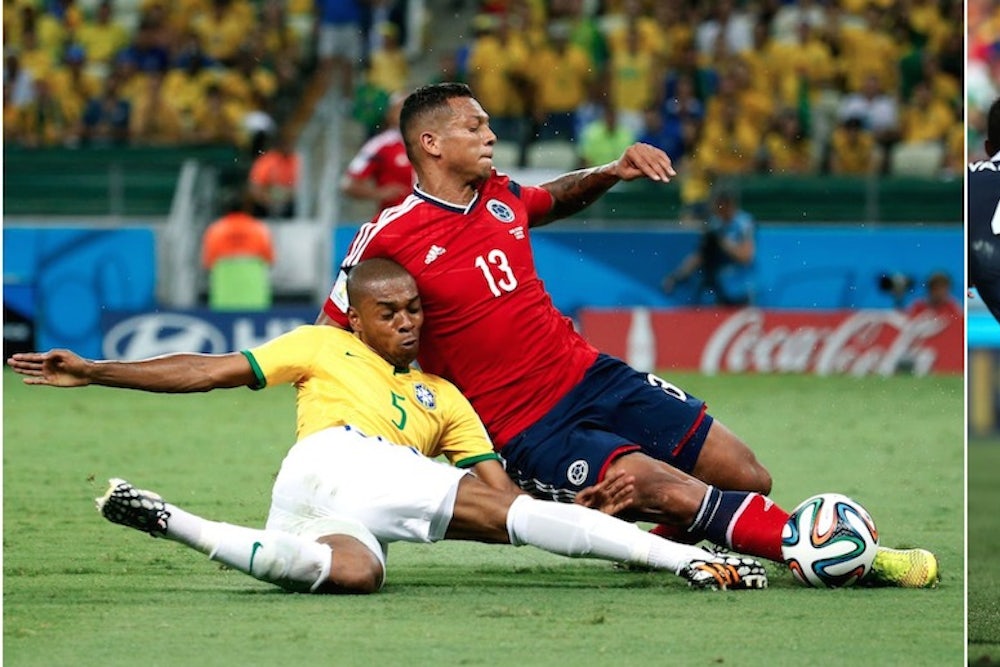Germany and Brazil are the two most successful teams in World Cup history, so it’s funny to think that they have only met once before in the tournament. That was in the 2002 final, when Brazil claimed its fifth trophy and Ronaldo topped the all-time goal-scoring charts. It was also, incidentally, the day a certain Philipp Lahm, then 18 years old, and Bastian Schweinsteiger, 17, made it to the German youth championship final for Bayern Munich. Sitting on the bus back to Bavaria, Lahm and Schweinsteiger probably could not have imagined that 2002 would be their country’s last international tournament without them. Now, 12 years later, these twin hearts of the German team will line up on Tuesday in the semi-final against Brazil in the hopes of erasing their nation’s reputation as the eternal also rans.
This is Germany’s fourth consecutive World Cup semi-final, beginning with that 2002 run, but this remarkable achievement is no longer enough for Joachim Löw and his men. After enduring considerable criticism for their lackluster display against Algeria, the Germans proved against France that they have the mettle and the skill to go the distance. After taking an early lead in the 13th minute, the Germans never let up the pressure, displaying the refuse-to-lose mentality that has been a missing ingredient for teams eliminated earlier. (See Mexico against the Dutch.) Despite leading for 77 minutes, they still outran the French by 4.7 miles in the searing heat and humidity of the Maracana.
The Germans pair their work ethic with a passing game. They are the tournament’s best at stringing the ball together, having completed 2,938 passes to the Brazilians' 1,816, with an accuracy of 80 percent. As such, they will try to start the semi-final slowly, to give themselves time to settle into their passing rhythm, while Brazil will come out with guns blazing and try to overrun their opponents. What will be key for the Germans is to survive the initial onslaught. Per Mertesacker could return in defense to help deal with the Brazilian’s aerial threat (they’ve scored three of ten goals from set pieces), while Löw will probably stick to playing Lahm in defense and the formidable pair of Schweinsteiger and Khedira in midfield.
For Brazil, the pre-match buildup has centered around Neymar’s horrific spinal injury and the team’s chances without him, but Luis Felipe Scolari’s side will be no less dangerous. Oscar will move to the center, a position where his acute vision and elegant passing can unleash Hulk and Fred and dictate the rhythm of the game. Dante, who knows his opponents well from playing at Bayern Munich, is a worthy replacement for captain Thiago Silva, who's suspended on consecutive yellows (though the Brazilian federation is appealing FIFA to have him reinstated). Defensive midfielder Luiz Gustavo, one of the Seleçao’s best players this tournament, will return from his own suspension to provide cover for Oscar and challenge the dominant German midfield. In terms of personnel this Brazil team has enough to defeat the Germans; it’s their psychological reliance on Neymar they will have to overcome.
What Brazil won’t have, perhaps for the first time this tournament, is physical superiority. Their game plan against Colombia was to dominate the game physically, but the Germans will not be outmatched in size like the Cafeteros, and have the class to pass their way out of trouble. While James Rodriguez spent much of that quarterfinal being upended, the Germans do not rely on any single player and therefore have no clear target for the Brazilians’ rough-housing.
These are the two of the most pedigreed sides in the world, with 18 semi-final appearances and eight trophies between them. Making this matchup all the more intriguing is that neither side fits the traditional stereotype of its national team. The Brazilians have muscled their way through, with only a few flourishes of jogo bonito. The Germans, meanwhile, are no longer the ruthless machine of past generations and seek to play a more aesthetically pleasing game. Whoever wins tomorrow will make history. Will Brazil do it by remaining undefeated for a 63rd straight competitive home game, or will Germany go one step closer to becoming the first European team to win in South America?
